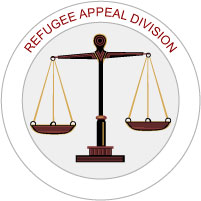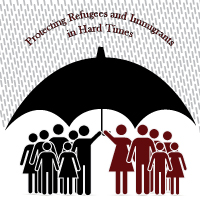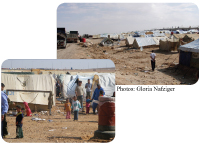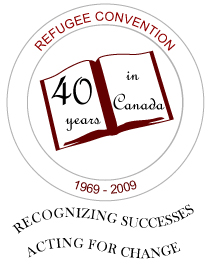***
Canadian Council for Refugees E-Chronicle Vol. 4 #2, 1 May 2009
CONTENTS:
- CCR and Amnesty International Call for Suspension of Removal for Refugee Family
- Refugee Appeal Division bill passes second reading in the House of Commons
- Auditor General on Immigration and Refugee Board (IRB) appointments
- New citizenship law in effect April 17th: Concerns over statelessness
- Protecting Refugees and Immigrants in Hard Times: the CCR Spring Consultation in Quebec City, 28-30 May 2009
- New from the CCR
 The CCR and Amnesty International Canada called on the government in early April to suspend the removal of a Colombian family – a removal that would violate international law. The family’s refugee claim has never been examined even though they have strong grounds to fear persecution in their home country.
The CCR and Amnesty International Canada called on the government in early April to suspend the removal of a Colombian family – a removal that would violate international law. The family’s refugee claim has never been examined even though they have strong grounds to fear persecution in their home country.
Detained for the previous seven weeks in the Toronto area, the family are the victims of poorly drafted legislation and of the US-Canada Safe Third Country Agreement. Twice the family has asked for Canada’s protection and twice Canada has refused to even examine their claim, once because they were barred as a result of the Safe Third Country Agreement and the second time because the law only allows one claim, even if the first claim was not examined. They have also been denied a Pre-Removal Risk Assessment. Since their story was highlighted in the media, the family has been granted a temporary stay of removal, but there has been no further action from the government and the family remains in immigration detention.
The family fear persecution at the hands of the Revolutionary Armed Forces of Colombia (FARC), an armed guerrilla group which has been engaged in a 40 year old armed conflict with the Colombian government. The family reports that, as farmers, they were forced to pay ‘taxes’ to FARC, and when they could no longer meet the demands, members of the family were kidnapped, tortured and raped.
The family’s case highlights serious deficiencies in Canada’s refugee protection system. The family had strong reasons for believing that the USA is not safe for them, contrary to the Canadian government’s claims in designating the US a safe third country. Furthermore, even though they have been denied the right to make a claim in Canada because the US is allegedly safe, the Canadian government is now proposing to remove them not to the US, but to Colombia, where they face persecution.
For the full press release, see: http://ccrweb.ca/en/bulletin/09/04/08
For more information on Canada-US Safe Third Country Agreement, see: http://www.ccrweb.ca/S3C.htm
 The House of Commons debated Bill C-291 to implement the Refugee Appeal Division and then passed the bill at second reading on 22 April 2009 by a slim margin: 140 voices in favour, 134 against. The bill now moves on to the Standing Committee on Citizenship and Immigration for further study.
The House of Commons debated Bill C-291 to implement the Refugee Appeal Division and then passed the bill at second reading on 22 April 2009 by a slim margin: 140 voices in favour, 134 against. The bill now moves on to the Standing Committee on Citizenship and Immigration for further study.
The CCR encourages members to continue contacting Members of Parliament, especially members of the Standing Committee about Bill C-291. Join the CCR in urging the Committee to complete its study very quickly, given that the bill has already been studied by both the House and the Senate in the previous Parliament.
You can read the debate on Bill C-291 in the House of Commons at: http://tinyurl.com/cwrq6x
To see how your Member of Parliament voted on the Refugee Appeal Division, see: http://tinyurl.com/dgqsvl
Background information
The Immigration and Refugee Protection Act approved by Parliament in 2001 created the Refugee Appeal Division. However in 2002, the government implemented the Act but not the sections that give refugee claimants the right to appeal to the Refugee Appeal Division.
For nearly seven years, refugee claimants in Canada have been denied the appeal that Parliament granted them in the Immigration and Refugee Protection Act. Instead their fate is determined by a single decision maker in a system never approved by Parliament. Correcting this injustice is long overdue.
The previous Parliament voted to force the implementation of the Refugee Appeal Division. Both the House of Commons (in 2007) and the Senate (in 2008) approved Bill C-280, An Act to amend the Immigration and Refugee Protection Act calling for the implementation of the Refugee Appeal Division. However, the bill did not become law because the House still needed to approve the amendments made by the Senate when the 2008 elections were called. The text of Bill C-291 is the same as the previous Bill C-280 as amended by the Senate.
For more information on the Refugee Appeal Division and what you can do, see: http://www.ccrweb.ca/eng/campaigns/RADaction.htm
In her March 2009 report, the Auditor General of Canada , raised serious concerns over the government failure to appoint sufficient numbers of Board members in a timely manner. She found that:
The high number of Board member vacancies at the IRB had a significant impact on the Board’s capacity to process cases on a timely basis. The inventory of unresolved cases has reached an exceptionally high level.
The backlog is causing enormous hardship for refugees who are forced to wait years to receive protection and be able to get on with their lives in security. Some refugees are separated from immediate family members overseas – during the wait there is no prospect of family reunification, even if their relatives are at risk.
The Auditor General’s 31 March 2009 report is available at: http://tinyurl.com/cbjncq
For an article on the Auditor General’s report, see: ‘Government appointments delayed, botched, AG says’, Canadian Press, 31 March 2009, http://tinyurl.com/d3ld2j
 On April 17th, amendments to the Citizenship Act came into effect. While the new law restores citizenship for “lost Canadians”, it also creates a new category of “lost Canadians” by denying Canadians the right to pass on their citizenship if they are citizens born outside Canada to a Canadian citizen parent. The CCR is deeply concerned that this will lead to children of Canadian citizens being born stateless.
On April 17th, amendments to the Citizenship Act came into effect. While the new law restores citizenship for “lost Canadians”, it also creates a new category of “lost Canadians” by denying Canadians the right to pass on their citizenship if they are citizens born outside Canada to a Canadian citizen parent. The CCR is deeply concerned that this will lead to children of Canadian citizens being born stateless.
For information from the CCR on some of the impacts of the new law, see: http://www.ccrweb.ca/documents/citizenship09.htm
For information about statelessness, see Statelessness and Canada: An introduction, March 2009, http://ccrweb.ca/documents/statelessnessprimerEN.pdf
The CCR’s comments on the 2008 amendments to the Citizenship Act (Bill C-37), see: http://www.ccrweb.ca/documents/c-37.pdf
For news coverage of the new law, see: ‘As many 'Lost Canadians' gain citizenship, others are left in limbo’, CBC News, 17 April 2009. http://www.cbc.ca/canada/story/2009/04/16/lost-canadians.html
- Protecting Refugees and Immigrants in Hard Times: the CCR Spring Consultation in Quebec City, 28-30 May 2009
 From 28 to 30 May 2009, people concerned for refugee and immigrant rights from across Canada will be gathering in Quebec City for the Canadian Council for Refugees (CCR) Spring 2009 Consultation.
From 28 to 30 May 2009, people concerned for refugee and immigrant rights from across Canada will be gathering in Quebec City for the Canadian Council for Refugees (CCR) Spring 2009 Consultation.
Take advantage of this opportunity to:
- Learn about the latest developments on issues affecting refuges and immigrants
- Discuss with others experienced in refugee and immigrant integration issues in Quebec and from across Canada.
- Gain professional training and strategize on a wide range of topics on refugee protection, refugee sponsorship and refugee and immigrant settlement.
- Meet more than 300 refugee and immigrant rights advocates and service providers from across Canada.
- Participate in ongoing dialogue on refugee and immigration policy and programs.
The consultation is an excellent opportunity for all interested to exchange ideas on barriers refugees and newcomers face before, at and after their arrival in Canada. Consultation participants include refugees, immigrants, representatives of NGOs, youth advocates, government, UNHCR, academics and international guests.
Consultation discussions will address issues that challenge refugees, immigrants, advocates and community workers. In addition to larger plenary sessions, workshops and working sessions will produce strategies for further collaboration and specific actions.
Topics to be addressed at the consultation include Housing and newcomers, Protracted refugee situations: the Canadian civil society response, Responding to refugees with medical needs, Combatting fraud targetting refugees and immigrants, Racialization of poverty, Children in detention, Temporary workers, Youth community orientation resources, and many more.
Information about the consultation and online registration forms are now available at: http://www.ccrweb.ca/eng/about/meetings.htm Don’t forget to register before the end of today. May 1st is the last day to take advantage of reduced registration rates fees!
Please help us to promote this Consultation by passing this invitation to people who might be interested in attending and by directing people to the consultation webpage at: http://www.ccrweb.ca/eng/about/meetings.htm
 ‘We've gone from running from a fast death in Iraq to slow death in the camps.’
‘We've gone from running from a fast death in Iraq to slow death in the camps.’
- A Palestinian refugee woman in a camp on the Iraq-Syria border
About 3,000 stateless Palestinian refugees are stranded in dangerous camps on the Syria-Iraq border, waiting for a country to accept them for resettlement. They have been forced out of Iraq but are denied asylum anywhere else.
Find out what you can do to help Palestinian refugees forced out of Iraq and invite others to become involved. Join the call for Canada to support the increased resettlement of refugees from Iraq, including Palestinians who are particularly vulnerable.
For more information, check out the factsheet on Palestinian Refugees Forced Out of Iraq at: http://www.ccrweb.ca/documents/PalestiniansFAQs.pdf and the CCR's webpage on the Iraqi Refugee Crisis at: http://www.ccrweb.ca/iraq.htm
- Brief History of Canada’s Response to Refugees
 On 4 June 1969, Canada belatedly signed the Convention relating to the Status of Refugees, 18 years after it was adopted by the United Nations, and 15 years after it entered into force.
On 4 June 1969, Canada belatedly signed the Convention relating to the Status of Refugees, 18 years after it was adopted by the United Nations, and 15 years after it entered into force.
In the 40 years since Canada became a party to the Refugee Convention, it has gained the enviable reputation of being a world leader in protecting refugees.
In fact, there has been good and bad in Canadian responses to refugees, both before and after signing the Refugee Convention.
For a timeline and brief history of Canada’s response to refugees, see: http://www.ccrweb.ca/canadarefugeeshistory.htm
We encourage you to use the information in the timelines as a part of your efforts to advocate for refugee and immigrant rights as part of the 40th anniversary of Canada’s signing of the Refugee Convention. For more information, see http://ccrweb.ca/40thanniversary.htm.
